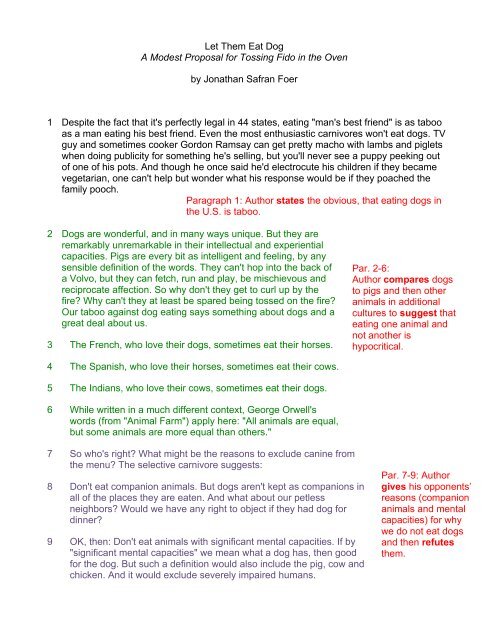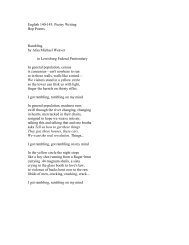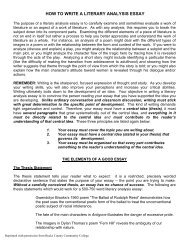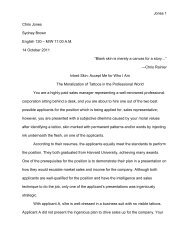Let Them Eat Dog A Modest Proposal for Tossing Fido in the Oven ...
Let Them Eat Dog A Modest Proposal for Tossing Fido in the Oven ...
Let Them Eat Dog A Modest Proposal for Tossing Fido in the Oven ...
Create successful ePaper yourself
Turn your PDF publications into a flip-book with our unique Google optimized e-Paper software.
<strong>Let</strong> <strong>Them</strong> <strong>Eat</strong> <strong>Dog</strong><br />
A <strong>Modest</strong> <strong>Proposal</strong> <strong>for</strong> <strong>Toss<strong>in</strong>g</strong> <strong>Fido</strong> <strong>in</strong> <strong>the</strong> <strong>Oven</strong><br />
by Jonathan Safran Foer<br />
1 Despite <strong>the</strong> fact that it's perfectly legal <strong>in</strong> 44 states, eat<strong>in</strong>g "man's best friend" is as taboo<br />
as a man eat<strong>in</strong>g his best friend. Even <strong>the</strong> most enthusiastic carnivores won't eat dogs. TV<br />
guy and sometimes cooker Gordon Ramsay can get pretty macho with lambs and piglets<br />
when do<strong>in</strong>g publicity <strong>for</strong> someth<strong>in</strong>g he's sell<strong>in</strong>g, but you'll never see a puppy peek<strong>in</strong>g out<br />
of one of his pots. And though he once said he'd electrocute his children if <strong>the</strong>y became<br />
vegetarian, one can't help but wonder what his response would be if <strong>the</strong>y poached <strong>the</strong><br />
family pooch.<br />
Paragraph 1: Author states <strong>the</strong> obvious, that eat<strong>in</strong>g dogs <strong>in</strong><br />
<strong>the</strong> U.S. is taboo.<br />
2 <strong>Dog</strong>s are wonderful, and <strong>in</strong> many ways unique. But <strong>the</strong>y are<br />
remarkably unremarkable <strong>in</strong> <strong>the</strong>ir <strong>in</strong>tellectual and experiential<br />
capacities. Pigs are every bit as <strong>in</strong>telligent and feel<strong>in</strong>g, by any<br />
sensible def<strong>in</strong>ition of <strong>the</strong> words. They can't hop <strong>in</strong>to <strong>the</strong> back of<br />
a Volvo, but <strong>the</strong>y can fetch, run and play, be mischievous and<br />
reciprocate affection. So why don't <strong>the</strong>y get to curl up by <strong>the</strong><br />
fire Why can't <strong>the</strong>y at least be spared be<strong>in</strong>g tossed on <strong>the</strong> fire<br />
Our taboo aga<strong>in</strong>st dog eat<strong>in</strong>g says someth<strong>in</strong>g about dogs and a<br />
great deal about us.<br />
3 The French, who love <strong>the</strong>ir dogs, sometimes eat <strong>the</strong>ir horses.<br />
Par. 2-6:<br />
Author compares dogs<br />
to pigs and <strong>the</strong>n o<strong>the</strong>r<br />
animals <strong>in</strong> additional<br />
cultures to suggest that<br />
eat<strong>in</strong>g one animal and<br />
not ano<strong>the</strong>r is<br />
hypocritical.<br />
4 The Spanish, who love <strong>the</strong>ir horses, sometimes eat <strong>the</strong>ir cows.<br />
5 The Indians, who love <strong>the</strong>ir cows, sometimes eat <strong>the</strong>ir dogs.<br />
6 While written <strong>in</strong> a much different context, George Orwell's<br />
words (from "Animal Farm") apply here: "All animals are equal,<br />
but some animals are more equal than o<strong>the</strong>rs."<br />
7 So who's right What might be <strong>the</strong> reasons to exclude can<strong>in</strong>e from<br />
<strong>the</strong> menu The selective carnivore suggests:<br />
8 Don't eat companion animals. But dogs aren't kept as companions <strong>in</strong><br />
all of <strong>the</strong> places <strong>the</strong>y are eaten. And what about our petless<br />
neighbors Would we have any right to object if <strong>the</strong>y had dog <strong>for</strong><br />
d<strong>in</strong>ner<br />
9 OK, <strong>the</strong>n: Don't eat animals with significant mental capacities. If by<br />
"significant mental capacities" we mean what a dog has, <strong>the</strong>n good<br />
<strong>for</strong> <strong>the</strong> dog. But such a def<strong>in</strong>ition would also <strong>in</strong>clude <strong>the</strong> pig, cow and<br />
chicken. And it would exclude severely impaired humans.<br />
Par. 7-9: Author<br />
gives his opponents’<br />
reasons (companion<br />
animals and mental<br />
capacities) <strong>for</strong> why<br />
we do not eat dogs<br />
and <strong>the</strong>n refutes<br />
<strong>the</strong>m.
2<br />
10 Then: It's <strong>for</strong> good reason that <strong>the</strong> eternal taboos—don't fiddle<br />
with your crap, kiss your sister, or eat your companions—are<br />
taboo. Evolutionarily speak<strong>in</strong>g, those th<strong>in</strong>gs are bad <strong>for</strong> us. But<br />
dog eat<strong>in</strong>g isn't a taboo <strong>in</strong> many places, and it isn't <strong>in</strong> any way<br />
bad <strong>for</strong> us. Properly cooked, dog meat poses no greater health<br />
risks than any o<strong>the</strong>r meat.<br />
11 <strong>Dog</strong> meat has been described as "gamey" "complex," "buttery"<br />
and "floral." And <strong>the</strong>re is a proud pedigree of eat<strong>in</strong>g it. Fourthcentury<br />
tombs conta<strong>in</strong> depictions of dogs be<strong>in</strong>g slaughtered<br />
along with o<strong>the</strong>r food animals. It was a fundamental enough<br />
habit to have <strong>in</strong><strong>for</strong>med language itself: <strong>the</strong> S<strong>in</strong>o-Korean<br />
character <strong>for</strong> "fair and proper" (yeon) literally translates <strong>in</strong>to<br />
"as cooked dog meat is delicious." Hippocrates praised dog<br />
meat as a source of strength. Dakota Indians enjoyed dog<br />
liver, and not so long ago Hawaiians ate dog bra<strong>in</strong>s and blood.<br />
Capta<strong>in</strong> Cook ate dog. Roald Amundsen famously ate his sled<br />
dogs. (Granted, he was really hungry.) And dogs are still eaten<br />
Par. 10-11: Author<br />
concedes that taboos<br />
are important, but<br />
argues that dog meat is<br />
as safe as any o<strong>the</strong>r<br />
meat and <strong>the</strong>n<br />
describes its taste and<br />
consumption <strong>in</strong> various<br />
cultures.<br />
to overcome bad luck <strong>in</strong> <strong>the</strong> Philipp<strong>in</strong>es; as medic<strong>in</strong>e <strong>in</strong> Ch<strong>in</strong>a and Korea; to enhance<br />
libido <strong>in</strong> Nigeria and <strong>in</strong> numerous places, on every cont<strong>in</strong>ent, because <strong>the</strong>y taste good.<br />
For centuries, <strong>the</strong> Ch<strong>in</strong>ese have raised special breeds of dogs, like <strong>the</strong> black-tongued<br />
chow, <strong>for</strong> chow, and many European countries still have laws on <strong>the</strong> books regard<strong>in</strong>g<br />
postmortem exam<strong>in</strong>ation of dogs <strong>in</strong>tended <strong>for</strong> human consumption.<br />
12 Of course, someth<strong>in</strong>g hav<strong>in</strong>g been done just about everywhere is<br />
no k<strong>in</strong>d of justification <strong>for</strong> do<strong>in</strong>g it now. But unlike all farmed meat,<br />
which requires <strong>the</strong> creation and ma<strong>in</strong>tenance of animals, dogs are<br />
practically begg<strong>in</strong>g to be eaten. Three to four million dogs and<br />
cats are euthanized annually. The simple disposal of <strong>the</strong>se<br />
euthanized dogs is an enormous ecological and economic<br />
problem. But eat<strong>in</strong>g those strays, those runaways, those notquite-cute-enough-to-take<br />
and not-quite-well-behaved-enough-tokeep<br />
dogs would be kill<strong>in</strong>g a flock of birds with one stone and<br />
eat<strong>in</strong>g it, too.<br />
13 In a sense it's what we're do<strong>in</strong>g already. Render<strong>in</strong>g—<strong>the</strong><br />
conversion of animal prote<strong>in</strong> unfit <strong>for</strong> human consumption <strong>in</strong>to<br />
food <strong>for</strong> livestock and pets—allows process<strong>in</strong>g plants to trans<strong>for</strong>m<br />
useless dead dogs <strong>in</strong>to productive members of <strong>the</strong> food cha<strong>in</strong>. In<br />
America, millions of dogs and cats euthanized <strong>in</strong> animal shelters<br />
every year become <strong>the</strong> food <strong>for</strong> our food. So let's just elim<strong>in</strong>ate<br />
this <strong>in</strong>efficient and bizarre middle step.<br />
Par. 12-13: Author<br />
concedes because<br />
o<strong>the</strong>rs eat dogs is not a<br />
reason we should, but<br />
<strong>the</strong>n po<strong>in</strong>ts out <strong>the</strong><br />
disturb<strong>in</strong>g fact that<br />
euthanized shelter dogs<br />
are used to feed farmed<br />
livestock, so <strong>in</strong> a sense,<br />
we are already eat<strong>in</strong>g<br />
dogs.
3<br />
14 This need not challenge our civility. We won't make <strong>the</strong>m suffer any more than<br />
necessary. While it's widely believed that adrenal<strong>in</strong>e makes dog meat taste better—<br />
hence <strong>the</strong> traditional methods of slaughter: hang<strong>in</strong>g, boil<strong>in</strong>g alive, beat<strong>in</strong>g to death—we<br />
can all agree that if we're go<strong>in</strong>g to eat <strong>the</strong>m, we should kill <strong>the</strong>m quickly and pa<strong>in</strong>lessly,<br />
right For example, <strong>the</strong> traditional Hawaiian means of hold<strong>in</strong>g <strong>the</strong> dog's nose shut—<strong>in</strong><br />
order to conserve blood—must be regarded (socially if not legally)<br />
as a no-no. Perhaps we could <strong>in</strong>clude dogs under <strong>the</strong> Humane<br />
Methods of Slaughter Act. That doesn't say anyth<strong>in</strong>g about how<br />
<strong>the</strong>y're treated dur<strong>in</strong>g <strong>the</strong>ir lives, and isn't subject to any<br />
mean<strong>in</strong>gful oversight or en<strong>for</strong>cement, but surely we can rely on<br />
<strong>the</strong> <strong>in</strong>dustry to "self-regulate," as we do with o<strong>the</strong>r eaten animals.<br />
15 Few people sufficiently appreciate <strong>the</strong> colossal task of feed<strong>in</strong>g a<br />
world of billions of omnivores who demand meat with <strong>the</strong>ir<br />
potatoes. The <strong>in</strong>efficient use of dogs—conveniently already <strong>in</strong><br />
areas of high human population (take note, local-food<br />
advocates)—should make any good ecologist blush. One could<br />
argue that various "humane" groups are <strong>the</strong> worst hypocrites,<br />
spend<strong>in</strong>g enormous amounts of money and energy <strong>in</strong> a futile<br />
attempt to reduce <strong>the</strong> number of unwanted dogs while at <strong>the</strong> very<br />
same time propagat<strong>in</strong>g <strong>the</strong> irresponsible no-dog-<strong>for</strong>-d<strong>in</strong>ner taboo.<br />
If we let dogs be dogs, and breed without <strong>in</strong>terference, we would<br />
create a susta<strong>in</strong>able, local meat supply with low energy <strong>in</strong>puts that would put even <strong>the</strong><br />
most efficient grass-based farm<strong>in</strong>g to shame. For <strong>the</strong> ecologically-m<strong>in</strong>ded it's time to<br />
admit that dog is realistic food <strong>for</strong> realistic environmentalists.<br />
16 For those already conv<strong>in</strong>ced, here's a classic Filip<strong>in</strong>o recipe I<br />
recently came across. I haven't tried it myself, but sometimes you<br />
can read a recipe and just know. Stewed <strong>Dog</strong>, Wedd<strong>in</strong>g Style<br />
Par. 14-15: Author<br />
asserts and describes<br />
how we can rema<strong>in</strong> civil<br />
and responsible by<br />
eat<strong>in</strong>g dogs.<br />
17 First, kill a medium-sized dog, and <strong>the</strong>n burn off <strong>the</strong> fur over a hot<br />
fire. Carefully remove <strong>the</strong> sk<strong>in</strong> while still warm and set aside <strong>for</strong><br />
later (may be used <strong>in</strong> o<strong>the</strong>r recipes). Cut meat <strong>in</strong>to 1" cubes.<br />
Mar<strong>in</strong>ate meat <strong>in</strong> mixture of v<strong>in</strong>egar, peppercorn, salt, and garlic<br />
<strong>for</strong> 2 hours. Fry meat <strong>in</strong> oil us<strong>in</strong>g a large wok over an open fire,<br />
<strong>the</strong>n add onions and chopped p<strong>in</strong>eapple and sauté until tender.<br />
Pour <strong>in</strong> tomato sauce and boil<strong>in</strong>g water, add green pepper, bay<br />
leaf, and Tabasco. Cover and simmer over warm coals until meat<br />
is tender. Blend <strong>in</strong> purée of dog's liver and cook <strong>for</strong> additional 5–7<br />
m<strong>in</strong>utes.<br />
Par. 16-17: Author<br />
describes a classic<br />
recipe <strong>for</strong> prepar<strong>in</strong>g<br />
dogs.
4<br />
18 There is an overabundance of rational reasons to say no to<br />
factory-farmed meat: It is <strong>the</strong> No. 1 cause of global warm<strong>in</strong>g, it<br />
systematically <strong>for</strong>ces tens of billions of animals to suffer <strong>in</strong> ways<br />
that would be illegal if <strong>the</strong>y were dogs, it is a decisive factor <strong>in</strong> <strong>the</strong><br />
development of sw<strong>in</strong>e and avian flus, and so on. And yet even<br />
most people who know <strong>the</strong>se th<strong>in</strong>gs still aren't <strong>in</strong>spired to order<br />
someth<strong>in</strong>g else on <strong>the</strong> menu. Why<br />
19 Food is not rational. Food is culture, habit, crav<strong>in</strong>g and identity.<br />
Respond<strong>in</strong>g to factory farm<strong>in</strong>g calls <strong>for</strong> a capacity to care that<br />
dwells beyond <strong>in</strong><strong>for</strong>mation. We know what we see on undercover<br />
videos of factory farms and slaughterhouses is wrong. (There are<br />
those who will defend a system that allows <strong>for</strong> occasional animal<br />
cruelty, but no one defends <strong>the</strong> cruelty, itself.) And despite it be<strong>in</strong>g<br />
entirely reasonable, <strong>the</strong> case <strong>for</strong> eat<strong>in</strong>g dogs is likely repulsive to<br />
just about every reader of this paper. The <strong>in</strong>st<strong>in</strong>ct comes be<strong>for</strong>e<br />
our reason, and is more important.<br />
Par. 18-19: Author<br />
argues and gives<br />
reasons <strong>for</strong> his ma<strong>in</strong><br />
po<strong>in</strong>t: <strong>Eat</strong><strong>in</strong>g farmed<br />
meat is not rational; <strong>in</strong><br />
fact, it is wrong—just as<br />
wrong as eat<strong>in</strong>g dogs.<br />
He wants his reader to<br />
use reason—to see <strong>the</strong><br />
irony and hypocrisy <strong>in</strong><br />
<strong>the</strong> situation.<br />
____________________________________________________________________________<br />
Source: Onl<strong>in</strong>e periodical (magaz<strong>in</strong>e) The Wall Street Journal. October 31, 2009.<br />
http://onl<strong>in</strong>e.wsj.com/article/SB10001424052748703574604574499880131341174.html










